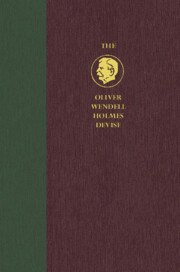Book contents
- The Hughes Court
- The Oliver Wendell Holmes Devise History of the Supreme Court of the United States
- Additional material
- Additional material
- The Hughes Court
- Copyright page
- Contents
- Acknowledgments
- Preface
- Table of Cases
- Introduction
- Part I The Opening Years
- Part II Continuities
- Section A: Administrative Law
- Section B: Civil Liberties and Civil Rights
- Chapter 23 The Uncertainties of Theory
- Chapter 24 Progressivism, Prohibition, and Organized Crime
- Chapter 25 Race, Criminal Justice, and “Labor Defense”
- Chapter 26 Race and Strategic Litigation
- Chapter 27 The Hughes Court and Radical Political Dissent
- Chapter 28 The Hughes Court and Radical Religious Dissent
- Section C: Justiciability
- Part III New Approaches Begin to Emerge
- Historiographical Essay
- Index
Chapter 24 - Progressivism, Prohibition, and Organized Crime
Criminal Law in the 1930s
from Section B: Civil Liberties and Civil Rights
Published online by Cambridge University Press: 13 January 2022
- The Hughes Court
- The Oliver Wendell Holmes Devise History of the Supreme Court of the United States
- Additional material
- Additional material
- The Hughes Court
- Copyright page
- Contents
- Acknowledgments
- Preface
- Table of Cases
- Introduction
- Part I The Opening Years
- Part II Continuities
- Section A: Administrative Law
- Section B: Civil Liberties and Civil Rights
- Chapter 23 The Uncertainties of Theory
- Chapter 24 Progressivism, Prohibition, and Organized Crime
- Chapter 25 Race, Criminal Justice, and “Labor Defense”
- Chapter 26 Race and Strategic Litigation
- Chapter 27 The Hughes Court and Radical Political Dissent
- Chapter 28 The Hughes Court and Radical Religious Dissent
- Section C: Justiciability
- Part III New Approaches Begin to Emerge
- Historiographical Essay
- Index
Summary
Crminal law cases in the Court typically arose out of the enforcement of Prohibition and mostly dealt with issues about searches, though the Court did issue one important decision on the general part of criminal law delineating the scope of the entrapment or government misconduct defense. With Prohibition discredited and repealed early in the decade, the Court’s decisions ordinarily found that the searches at issue were unlawful. Prohibition led to the rise of organized crime, and some of the Court’s decisions addressed and usually allowed legal strategies aimed at organized crime, although one important decision struck down a New Jersey statute penalizing membership in criminal gangs. The decisions sometimes led the Court to consider how the law should respond to technological innovations -- airplanes for one, but wiretapping a more important one. One theme surfaced on occasion: the importance of porfessionalism in the administration of criminal justice.
Keywords
- Type
- Chapter
- Information
- The Hughes CourtFrom Progressivism to Pluralism, 1930 to 1941, pp. 565 - 609Publisher: Cambridge University PressPrint publication year: 2022

